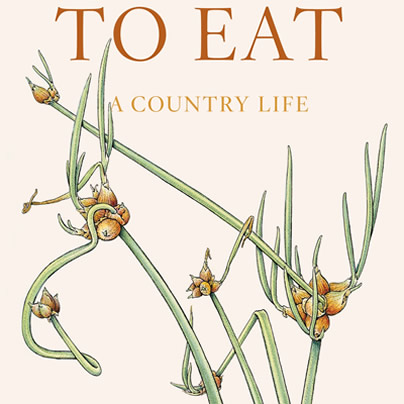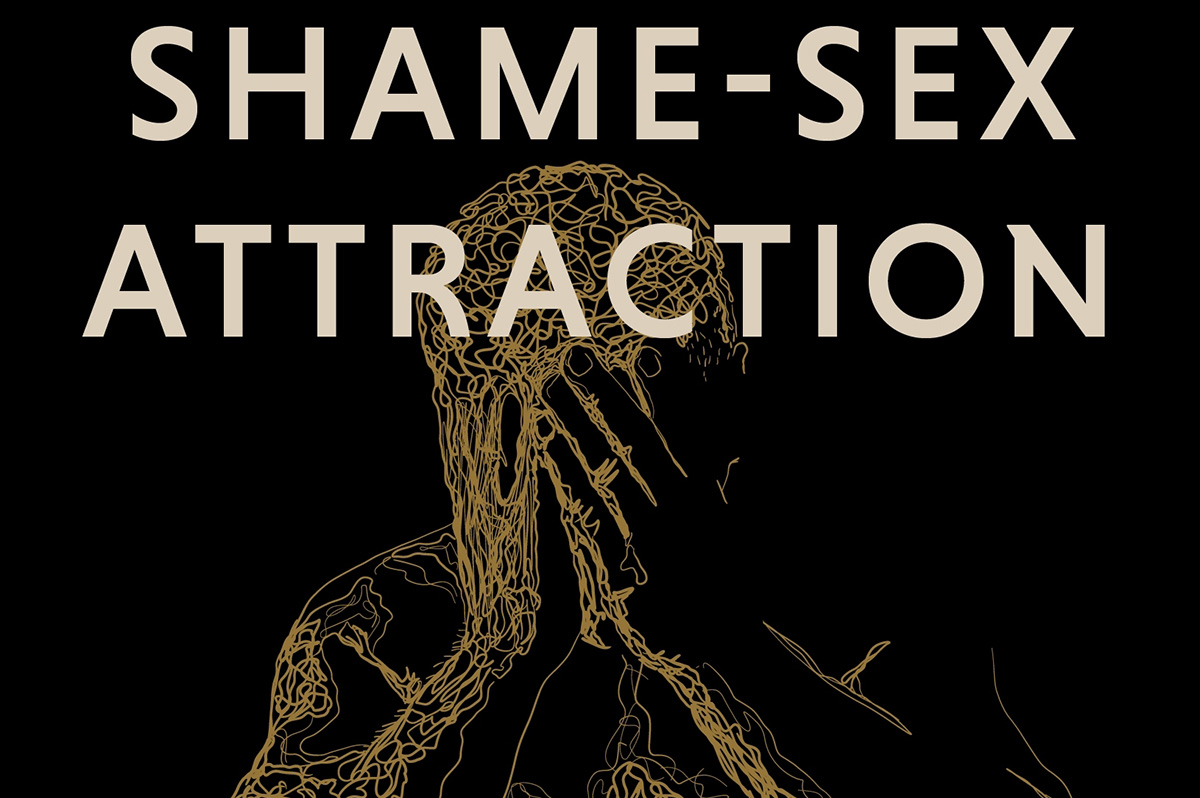Books
Savoring the bounty
Gay gardeners celebrate lives spent growing their own food

‘To Eat: A Country Life’
By Joe Eck and Wayne Winterrowd
Farrar, Straus and Giroux
$25
194 pages

(Image courtesy of Farrar, Straus and Giroux)
It’s 10 minutes to lunchtime and your stomach is smarter than you are.
You want to finish the project in front of you, but your stomach has other ideas. It snarls and aches and reminds you that breakfast was hours ago. At that point, you know you might as well give in, no matter what kind of work is on your plate. You won’t get anything done anyhow.
But where will that next meal come from? In the new book “To Eat” by Joe Eck and Wayne Winterrowd, you’ll read a tribute to gardening and to knowing what’s really on your plate.
In early 1970, Eck and partner Winterrowd, moved from Boston to Pepperell, Mass., and into a 211-year-old farmhouse surrounded by wooded land and a vegetable garden. They’d always wanted to be country gentlemen and they “could not have been more lucky than to start in that house.”
There, they learned and they ate. They discovered gardening tricks, and they ate. They delighted in experimenting with crops, and they ate.
“Eating,” they say, “has always been central.”
After a “glorious year” in Copenhagen (where chickens happily scrabbled on parquet floors and gardening was sorely missed), the men moved on to Boston and a Victory Garden near the Fenway. In 1974, they moved onto 28 acres of weeds and woods in South Vermont. They named their estate North Hill and set about making gardens, arbors and meals.
They planted four different kinds of apple trees, each “near sticks” when put in the ground. Those trees yield snacks and eventually pies and sauce. Their spinach crop is good, but not as good as they had in Pepperell; then again, spinach is tricky. Beets were used for salads and sides; carrots were found wild and cultivated; roadside “weeds” became delicious meals; and while they once grew unusual kinds of potatoes, they gladly saw their favorites become national staples. They raised pigs (“Showering with a pig is not a common experience”), beef and chickens; and delighted in Brussels sprouts in winter, rhubarb in spring, lettuce all summer long and onions in the fall.
“No matter how excellent … the produce of your best local supermarket may be,” they say, “there is something deeply rewarding to growing your own food.”
Partly a love letter to the earth and partly a paean to good eating, “To Eat” is one of those delicious little books that, like a great meal, you’ll want to savor.
With the circumspection of veteran gardeners, New England authors Joe Eck and the late Wayne Winterrowd share their observations about growing plants, livestock and their relationship. I took great delight in their quietly humorous stories of being gentlemen farmers; if you’re a gardener, you’ll find solid tips in each quick-to-read chapter and if you’re a gourmand, you’ll drool at the recipes here, too.
At just under 200 pages, this book will last you through two or three quick lunches or meal-preps, and it may give you some new ideas. So grab “To Eat” and take a bite.
Books
Chronicling disastrous effects of ‘conversion therapy’
New book uncovers horror, unexpected humor of discredited practice

‘Shame-Sex Attraction: Survivors’ Stories of Conversion Therapy’
By Lucas F. W. Wilson
c.2025, Jessica Kingsley Publishers
$21.95/190 pages
You’re a few months in, and it hasn’t gotten any easier.
You made your New Year’s resolutions with forethought, purpose, and determination but after all this time, you still struggle, ugh. You’ve backslid. You’ve cheated because change is hard. It’s sometimes impossible. And in the new book, “Shame-Sex Attraction” by Lucas F. W. Wilson, it can be exceptionally traumatic.

Progress does not come without problems.
While it’s true that the LGBTQ community has been adversely affected by the current administration, there are still things to be happy about when it comes to civil rights and acceptance. Still, says Wilson, one “particularly slow-moving aspect… has been the fight against what is widely known as conversion therapy.”
Such practices, he says, “have numerous damaging, death-dealing, and no doubt disastrous consequences.” The stories he’s collected in this volume reflect that, but they also mirror confidence and strength in the face of detrimental treatment.
Writer Gregory Elsasser-Chavez was told to breathe in something repellent every time he thought about other men. He says, in the end, he decided not to “pray away the gay.” Instead, he quips, he’d “sniff it away.”
D. Apple became her “own conversation therapist” by exhausting herself with service to others as therapy. Peter Nunn’s father took him on a surprise trip, but the surprise was a conversion facility; Nunn’s father said if it didn’t work, he’d “get rid of” his 15-year-old son. Chaim Levin was forced to humiliate himself as part of his therapy.
Lexie Bean struggled to make a therapist understand that they didn’t want to be a man because they were “both.” Jordan Sullivan writes of the years it takes “to re-integrate and become whole” after conversion therapy. Chris Csabs writes that he “tried everything to find the root of my problem” but “nothing so far had worked.”
Says Syre Klenke of a group conversion session, “My heart shattered over and over as people tried to console and encourage each other…. I wonder if each of them is okay and still with us today.”
Here’s a bit of advice for reading “Shame-Sex Attraction”: dip into the first chapter, maybe the second, then go back and read the foreword and introduction, and resume.
The reason: author Lucas F. W. Wilson’s intro is deep and steep, full of footnotes and statistics, and if you’re not prepared or you didn’t come for the education, it might scare you away. No, the subtitle of this book is likely why you’d pick the book up so because that’s what you really wanted, indulge before backtracking.
You won’t be sorry; the first stories are bracing and they’ll steel you for the rest, for the emotion and the tears, the horror and the unexpected humor.
Be aware that there are triggers all over this book, especially if you’ve been subjected to anything like conversion therapy yourself. Remember, though, that the survivors are just that: survivors, and their strength is what makes this book worthwhile. Even so, though “Shame-Sex Attraction” is an essential read, that doesn’t make it any easier.
The Blade may receive commissions from qualifying purchases made via this post.
Books
How one gay Catholic helped change the world
‘A Prince of a Boy,’ falls short of author’s previous work

Brian McNaught, the pioneering gay activist and author of 1986’s “On Being Gay” and 1993’s “Gay Issues in the Workplace,” has written a personal account about his Catholic faith and homosexuality. It is a memoir without much substance.
“A Prince of a Boy: How One Gay Catholic Helped Change the World” (Cascade Books) is a strong personal statement by McNaught. He helped change family relationships. He helped change attitudes about homosexuality. He helped change workplaces, but the world?

In January 2023, the Catholic News Service reported that Pope Francis announced that, “being homosexual is not a crime.” In December 2023, NPR reported that Pope Francis approved “Catholic blessings for same-sex couples, but not for marriage.” Francis died Monday at age 88. Although Catholics may not see homosexuality as a crime, they see sex outside of marriage as a sin. They see same-sex marriage as a sin.
In 2021, Gallup reported that membership in the Catholic Church had declined 20 percent since 2000. In 2025, the Pew Research Center’s Religious Landscape Study found that nearly 40 percent of Americans identified as Protestant, while the same study found that only 19 percent identified as Catholic.
McNaught devotes much of his book to his life as a gay Catholic. It is challenging to read about his personal struggle. Some readers may find it interesting. Others might find it boring. Catholic readers may find it more compelling than Protestant readers.
As the above statistics prove, McNaught has much more work to do to change the Catholic Church’s views about homosexuality. We should be glad for his contribution to the debate within the Catholic Church. We should pray for full acceptance of gays in the Catholic Church.
“A Prince of a Boy” becomes more interesting when McNaught describes his work as an educator on LGBTQ issues. He has had an impact on workplace policies, academic programs, and public education, and his lectures, books, and other materials are widely used.
Based on my experience in the federal government and volunteering with LGBTQ organizations from the Bay Area to Washington, D.C., I believe McNaught’s work as an educator has improved LGBTQ lives, careers, and families. During the Clinton administration, I gave many copies of “Gay Issues in the Workplace” to personnel directors. I felt their staff could benefit from reading it. I thought it would help the lives and careers of my federal LGBTQ colleagues.
McNaught’s “A Prince of a Boy” was released in December 2024. Anti-gay crusader Anita Bryant died the same month. Bryant campaigned against a gay rights law in Florida. She began a national campaign against gays.
When Bryant successfully reversed a gay rights ordinance in Dade County, Florida, McNaught wrote the important essay “Dear Anita, Late Night Thoughts of an Irish Catholic Homosexual.” The essay is not in “A Prince of a Boy”; however, McNaught mentions Bryant.
In his training programs, McNaught describes homosexuals as journeying from confusion to denial to acceptance to pride. “Anita Bryant and AIDS brought Gay people to identity pride very quickly,” McNaught writes. San Francisco Supervisor Harvey Milk (1930-1978) and other activists reached similar conclusions about Bryant’s vicious anti-gay campaign.
McNaught helped change the LGBTQ world and brought pride to many people’s lives. McNaught walks in pride, works in pride, and educates others in pride.
“A Prince of a Boy” is a disappointing book. It provides small details about Brian McNaught’s large, proud life. A meaningful biography about this great gay leader is long overdue.
The Blade may receive commissions from qualifying purchases made via this post.
Books
‘Pronoun Trouble’ reminds us that punctuation matters
‘They’ has been a shape-shifter for more than 700 years

‘Pronoun Trouble’
By John McWhorter
c.2025, Avery
$28/240 pages
Punctuation matters.
It’s tempting to skip a period at the end of a sentence Tempting to overuse exclamation points!!! very tempting to MeSs with capital letters. Dont use apostrophes. Ask a question and ignore the proper punctuation commas or question marks because seriously who cares. So guess what? Someone does, punctuation really matters, and as you’ll see in “Pronoun Trouble” by John McWhorter, so do other parts of our language.

Conversation is an odd thing. It’s spontaneous, it ebbs and flows, and it’s often inferred. Take, for instance, if you talk about him. Chances are, everyone in the conversation knows who him is. Or he. That guy there.
That’s the handy part about pronouns. Says McWhorter, pronouns “function as shorthand” for whomever we’re discussing or referring to. They’re “part of our hardwiring,” they’re found in all languages, and they’ve been around for centuries.
And, yes, pronouns are fluid.
For example, there’s the first-person pronoun, I as in me and there we go again. The singular I solely affects what comes afterward. You say “he-she IS,” and “they-you ARE” but I am. From “Black English,” I has also morphed into the perfectly acceptable Ima, shorthand for “I am going to.” Mind blown.
If you love Shakespeare, you may’ve noticed that he uses both thou and you in his plays. The former was once left to commoners and lower classes, while the latter was for people of high status or less formal situations. From you, we get y’all, yeet, ya, you-uns, and yinz. We also get “you guys,” which may have nothing to do with guys.
We and us are warmer in tone because of the inclusion implied. She is often casually used to imply cars, boats, and – warmly or not – gay men, in certain settings. It “lacks personhood,” and to use it in reference to a human is “barbarity.”
And yes, though it can sometimes be confusing to modern speakers, the singular word “they” has been a “shape-shifter” for more than 700 years.
Your high school English teacher would be proud of you, if you pick up “Pronoun Trouble.” Sadly, though, you might need her again to make sense of big parts of this book: What you’ll find here is a delightful romp through language, but it’s also very erudite.
Author John McWhorter invites readers along to conjugate verbs, and doing so will take you back to ancient literature, on a fascinating journey that’s perfect for word nerds and anyone who loves language. You’ll likely find a bit of controversy here or there on various entries, but you’ll also find humor and pop culture, an explanation for why zie never took off, and assurance that the whole flap over strictly-gendered pronouns is nothing but overblown protestation. Readers who have opinions will like that.
Still, if you just want the pronoun you want, a little between-the-lines looking is necessary here, so beware. “Pronoun Trouble” is perfect for linguists, writers, and those who love to play with words but for most readers, it’s a different kind of book, period.
The Blade may receive commissions from qualifying purchases made via this post.
-

 District of Columbia5 days ago
District of Columbia5 days agoD.C. police seek help in identifying suspect in anti-gay threats case
-

 Virginia2 days ago
Virginia2 days agoYoungkin calls on gay Va. GOP LG candidate to exit race over alleged ‘porn’ scandal
-

 Opinions5 days ago
Opinions5 days agoOn Pope Francis, Opus Dei and ongoing religious intolerance
-

 Commentary4 days ago
Commentary4 days agoA conversation about queers and class






